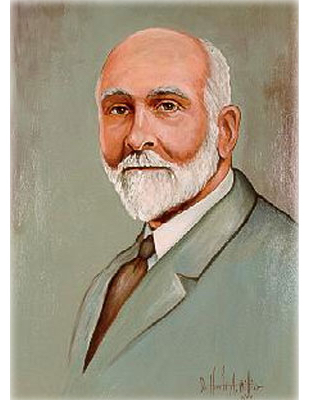“Jonathan Goforth (1859-1936) was a Canadian Presbyterian missionary to China, together with his wife, Rosalind (Bell-Smith) Goforth. Jonathan Goforth became the foremost missionary revivalist in early 20th-century China and helped to establish revivalism as a major element in Protestant China missions” (Wikipedia).
The challenging element in Goforth’s life is that he was never satisfied with less than the best that the Lord had prepared for him. Though he and his wife went to China in 1888 as traditional missionaries, he was not satisfied with the normal missionary model. He soon found a need for short-term trips as an evangelist. Instead of staying in one place and establishing a church and mission station, he travelled to different regions of China helping to encourage the believers and evangelise the lost.
The results were powerful. One source comments: “Returning to China in the fall of 1901, despite ‘success’ which would have satisfied most missionaries, Goforth longed to experience more of the work of God in his life and in the lives of the Chinese, and set his heart to seek the Lord for greater fruitfulness. In 1906 he witnessed the revival in Korea and learned that missionaries there had prayed together for months for God to do a new and mighty work. On the way back through Manchuria, at a gathering in Peitaho, he spoke to a large body of missionaries, who were deeply moved. For the next several days, they discarded the program of addresses and devoted themselves entirely to prayer, with many of them breaking down in tears and openly confessing their sins to each other.”
In that pursuit of God’s highest calling in his and his wife’s lives as missionaries, two challenging elements stand out.
Firstly, he faced many setbacks and struggles but he pressed on to God’s best for him and through him for others. For example, after he and Rosalind married in 1887, they went on to give birth to eleven children, but only six survived childhood. Five of their children died young through accident or disease in China. In 1889, early in their work in China, their daughter Gertrude came down with dysentery and died within a week. The grief-stricken father wrote home to his friends and family: “‘All things work together for good.’ [quoting Romans 8:28]. The Lord has a purpose in taking our loved one away. We pray that this loss will fit us more fully to tell these dying millions of Him who has gained the victory over death.”
Later, in 1898, “the Boxer madness engulfed the entire region. The Goforths and a few other missionaries made a harrowing journey through Boxer-infested territory towards a river where they could get a boat to safety. They lost all their belongings, and he suffered a sword wound but finally escaped.
In his latter years, their health, particularly his eyesight, failed, but through all of this, he still pressed on.
Secondly, Goforth from the time he was saved responded to the leading of the Holy Spirit. In Canada, he read Hudson Taylor’s China’s Spiritual Need and Claims, and the book so excited him that he ordered many copies and mailed them to many pastors that he knew in order to promote missionary work in China.
Much later, after what most would have felt was a successful missionary career, on their return to Henan in 1901, Goforth felt increasingly restless. In 1904 and 1905 he was inspired by news of the great Welsh revival and read Charles Finney’s Lectures on Revivals.
In 1907, circumstances brought him to witness first-hand the stirring Korean revival. During his extended time in Manchuria, the “Manchurian revival” broke out, the first such revival to gain nationwide publicity in China as well as internationally. The revival transformed Goforth’s life and ministry; from then on he was primarily an evangelist and revivalist, not a settled missionary.
When Goforth felt led by the Lord in a direction, he would press on in that direction. “Goforth was filled with joy at the prospect of carrying out a new plan for evangelising the northeast part of Henan, which had just been assigned to him. This incident highlights Goforth’s personality. When he thought that God had guided him to a certain course of action, he would persist in his opinion until his wife and his fellow missionaries agreed to let him follow his sense of leading. In that sense, it was hard to live and work with him. On the other hand, his wife testified to his kindness, gentleness, and willingness to sacrifice for the sake of others.”
The speaker at his funeral summed him up with these words: “He was a God-intoxicated man – fully surrendered and consecrated. Above all, he was humble. . . He was filled with the Spirit because he was emptied of self; therefore he had power which prevailed with God and man.”


